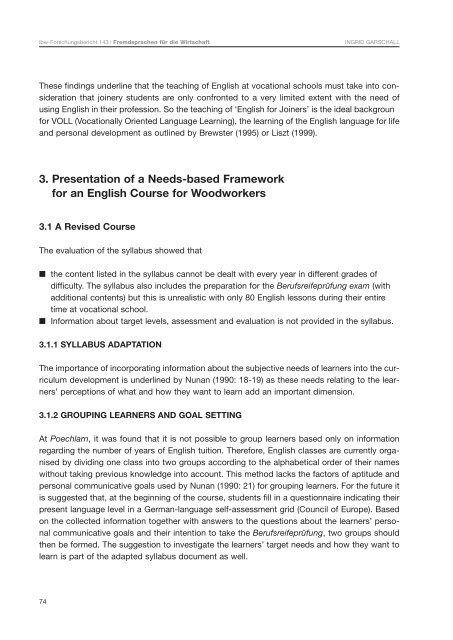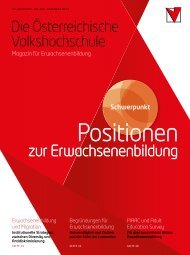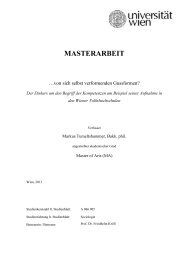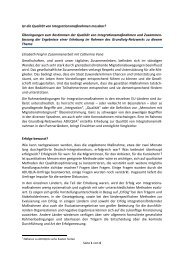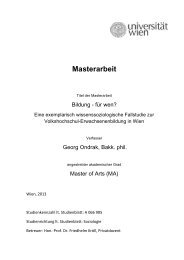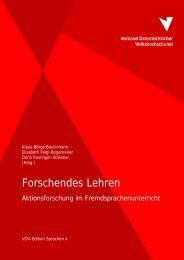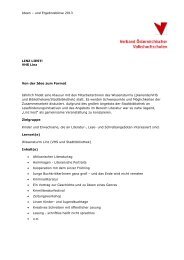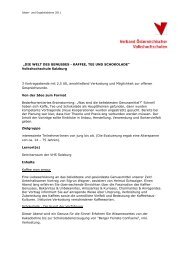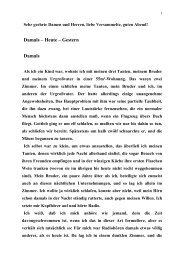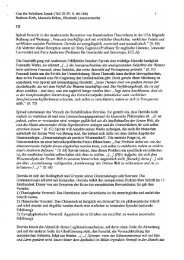Der sichere Umgang mit fremden Sprachen und Kulturen stellt heute ...
Der sichere Umgang mit fremden Sprachen und Kulturen stellt heute ...
Der sichere Umgang mit fremden Sprachen und Kulturen stellt heute ...
Sie wollen auch ein ePaper? Erhöhen Sie die Reichweite Ihrer Titel.
YUMPU macht aus Druck-PDFs automatisch weboptimierte ePaper, die Google liebt.
ibw-Forschungsbericht 143 | Fremdsprachen für die Wirtschaft INGRID GARSCHALL<br />
These findings <strong>und</strong>erline that the teaching of English at vocational schools must take into consideration<br />
that joinery students are only confronted to a very li<strong>mit</strong>ed extent with the need of<br />
using English in their profession. So the teaching of ‘English for Joiners’ is the ideal backgroun<br />
for VOLL (Vocationally Oriented Language Learning), the learning of the English language for life<br />
and personal development as outlined by Brewster (1995) or Liszt (1999).<br />
3. Presentation of a Needs-based Framework<br />
for an English Course for Woodworkers<br />
3.1 A Revised Course<br />
The evaluation of the syllabus showed that<br />
■ the content listed in the syllabus cannot be dealt with every year in different grades of<br />
difficulty. The syllabus also includes the preparation for the Berufsreifeprüfung exam (with<br />
additional contents) but this is unrealistic with only 80 English lessons during their entire<br />
time at vocational school.<br />
■ Information about target levels, assessment and evaluation is not provided in the syllabus.<br />
3.1.1 SYLLABUS ADAPTATION<br />
The importance of incorporating information about the subjective needs of learners into the curriculum<br />
development is <strong>und</strong>erlined by Nunan (1990: 18-19) as these needs relating to the learners’<br />
perceptions of what and how they want to learn add an important dimension.<br />
3.1.2 GROUPING LEARNERS AND GOAL SETTING<br />
At Poechlarn, it was fo<strong>und</strong> that it is not possible to group learners based only on information<br />
regarding the number of years of English tuition. Therefore, English classes are currently organised<br />
by dividing one class into two groups according to the alphabetical order of their names<br />
without taking previous knowledge into account. This method lacks the factors of aptitude and<br />
personal communicative goals used by Nunan (1990: 21) for grouping learners. For the future it<br />
is suggested that, at the beginning of the course, students fill in a questionnaire indicating their<br />
present language level in a German-language self-assessment grid (Council of Europe). Based<br />
on the collected information together with answers to the questions about the learners’ personal<br />
communicative goals and their intention to take the Berufsreifeprüfung, two groups should<br />
then be formed. The suggestion to investigate the learners’ target needs and how they want to<br />
learn is part of the adapted syllabus document as well.<br />
74


